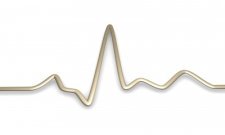Amiodarone Side Effects Cause
What They Are Supposed to Fix
What is Amiodarone Amiodarone Side Effects are no laughing matter. Amiodarone, also called Cordarone, is a drug in a class called 'Anti-Arrhythmatic' drugs. It is often given as a treatment for arrhythmia for both atrial (top of the heart), and bottom of the hear ventricular tachycardia. It is often given before Heart Surgery to PREVENT these heart problems and it is given after heart attacks or as a treatment for arrhythmia for no obvious reasons. Tens of thousands of people take Amiodarone for prevention of or the treatment for arrhythmia such as:
- Atrial Fibrillation
- Ventricular Tachycardia
- Heart Palpitations
But does Amiodarone actually WORK for these heart conditions? As we shall see, even though it is given to SO many people every day by cardiologists who are supposed to be extremely intelligent, the research shows that the Amiodarone Side Effects may negate any benefit that these drugs have on the heart- and that there may be better, safer alternatives that these cardiologists are just simply not offering to their patients. This is a common problem with heart medications, and many Antiarrthymic Drugs Might Cause Abnormal Heart Rhythms.
Amiodarone Side Effects

Prolonged QT Syndrome: While Amiodarone is supposed to stop heart arrhythmias, ironically the research on Amiodarone Side Effects shows that it has the tendency to actually cause arrhythmias that may be even more deadly than the ones that they are supposed to be fixing! Incidentally, this is called a Paradoxical Reaction when a drug causes exactly the opposite of the desired result.
The primary problem is that Amiodarone side effects, just like Beta Blocker Side Effects of another class of heart drugs, can cause a condition known as Prolonged QT Interval. Prolonged QT Interval, as you can read on its page, is a heart electrical conduction problem that can lead sudden death.
Proarrhythmia with class III antiarrhythmic drugs
Bradycardia: This is an unusual slowing of
the heart that can lead to problems such as low blood pressure, passing
out unexpectedly and feelings of dizziness. While some studies state
that these heart changes don't lead to sudden death except in rare
occasions, prolonged QT interval is an EXTREMELY dangerous condition to have that you certainly don't want to actually be GIVEN by taking a drug.
And most studies on Congestive Heart Failure Death
and death after myocardial infarction (heart attack) show no benefit to
taking Amiodarone in terms of survival. In fact, most studies show that
having an Implantable Cardiac Defibrillator (ICD) inserted into your
body is better for survival after heart attack and heart failure. But
could there be a better way to prevent these heart irregularities
without having to have a surgery?
Thyroid Dysfunction: Another common problem associated with Amiodarone is thyroid dysfunction. Amiodarone actually contains a high level of iodine, but the iodine does not act on the thyroid in the same way that natural iodine does. Several studies have shown definitively that amiodarone can lead to chronic thyroid problems. Sometimes these thyroid problems can be so bad they can lead to the requirement to have to have the thyroid surgically removed!(1) While this might be a worthwhile trade-off to have a proper functioning heart, as we saw above, that may not even necessarily be the case, and taking the drug could even lead to a higher risk of other types of heart problems.
Alternatives to Amiodarone
There IS an extremely promising way to avoid both the problems inherent with Amiodarone Side Effects and having surgery to get an implanted device into you. Many of these heart conduction problems may simply be Signs of Magnesium Deficiency that doctors are simply not recognizing because they are relying on outdated Magnesium Level blood testing that has been shown in study after study to be completely unreliable and not reflect the true magnesium status in the body.
amiodarone in the conversion of acute atrial
tachyarrhythmias, while initial slowing of
ventricular response rate in nonconverters appears
equally efficacious with both agents."
Parenteral magnesium sulfate versus Amiodarone
Studies that have been done comparing magnesium to these antiarrhythmic drugs show that it is often AS good if not BETTER than the drugs that they are being compared to. And this makes sense because very often the REASON that people are getting these arrhythmias in the first place is because of a 'subclinical' magnesium deficiency that hospital laboratory testing is not finding. Yet cardiologists RARELY have people on routine magnesium replacement despite the fact that magnesium deficiency is the CAUSE of the problems and it FIXES the problems better than the drugs that they ARE giving to these patients- who may subsequently have sudden death from the drugs! While doctors justify this by saying that Side Effects of Amiodarone, like sudden death, are 'RARE', it's certainly NOT rare if it happens to you or a loved one.
If you or a loved one is concerned about these Amiodarone Side Effects, I encourage you to read The Magnesium Miracle. You'll be amazed at the amount of research that there is supporting the use of magnesium for these heart arrhythmias. You'll wonder why the heck your doctor is subjecting you to potentially deadly Amiodarone Side Effects and not simply using magnesium. Keep reading to find out more about whether you are experiencing OTHER signs of magnesium deficiency as well....
Keep Reading --->
Signs of Magnesium Deficiency --->





